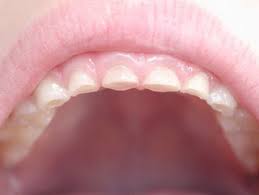
It is not normal for kids to clench their teeth at night. Night time clenching is a symptom of upper airway resistance and possibly even pediatric sleep apnea. We have had much success treating pediatric bruxism by diagnosing teeth crowding, child sleep apnea and tongue dysfunction. Usually the problem is mouth breathing and inadequate space in the mouth and nasal passageway for proper breathing patters during sleep. When the jaw spaces are small, the tongue will be displaced into the throat during sleep. The result is breathing problems during sleep. In particular, when the tongue is displaced into the throat, it will be a potent trigger for teeth clenching. We offer many orthodontic expander appliances that will create space so this will not happen.

kids bruxism grinding treatment
The ALF expander appliance and treating tongue ties and lip ties is very helpful and can prevent TMJ clenching and grinding and more severe sleep apnea in adulthood. Clenching is the bodies warning sign that there is a problem…it is not normal. The cause of the problem needs to be explored by a sleep apnea dentist and sleep doctor and treated.
Parents especially mothers need to be vigilant and cautious if they hear screeching and grinding sounds during their child’s sleep. Children under 11 years of age have higher tendency to grind and clench their teeth. You may also hear snoring, occasional gasping and tongue sounds. Severe clenching sounds may mimic that of scraping fingernails across a blackboard. It will be an element of surprise for you that the child will sleep soundly while clenching so much. This grinding, clenching and forceful chewing of teeth against opposing teeth is medically termed as bruxism. Bruxism is merely a symptom and child sleep apnea. Younger children suffer from bruxism and it is essential to detect this habit as soon as possible. Some parents may consider it a normal process. This leads to negligence and severe consequences in future.
Treatments for Child Bruxism:
- Rule out child sleep apnea
- Diagnose and treat any tongue disfunction such as tongue ties, lip ties ( also known as frenums ).
- Treat small mouth, teeth crowding and jaw under development with expanders such as an ALF dental appliance or Vivos DNA Appliance.
Consequences of persistent child bruxism:
- Severe tooth wear,
- Rapid tooth surface loss,
- Pain and discomfort especially in jaws and muscles of face,
- Sensitivity of teeth,
- Disturbed sleep,
- Tiredness in spite of long sleep hours,
- Irritability of the child,
- Confusion and depression,
- Chipped off teeth,
- Disturbed growth and development of babies,
- Psychological problems.
Excessive grinding, clenching and rubbing of teeth have been found mainly due to stress and anxiety in infants and children. Bruxism can also be a sign of sleep apnea and night time breathing issues. The child should be evaluated by a sleep dentist and sleep doctor for sleep apnea. Often a child’s airway can be improved with an expander such as an ALF appliance.

kids clenching bruxism
Stressful conditions can enhance teeth grinding:
- A major reason in such a young age can be eruption of teeth through the socket bone. Teething has been considered among the major causes of child anxiety. Infants feel agitated, cry and want to bite on every available thing around them,
- Earache can irritate children,
- When upper and lower teeth are not aligned properly,
- Introduction of new baby in the family,
- Shifting to a new neighborhood,
- Admission in a nursery school,
- Examination time period,
- A new teacher or caretaker,
- Arguing with parents or siblings,
- Loss of a friend during shifting home or school,
- Children with systemic diseases such as cerebral palsy or any other medical condition.
In Short, It Is Not Normal For Your Child To Grind Or Clench His/Her Teeth. You Must Consult Your Health Professional Regarding This Condition. It Is Very Important To Rule Out Child Sleep Apnea And Airway Issues. Following Points May Help You In Combating The Condition.
- Make sure your child exercise daily,
- Take him/her out for a walk,
- Talk to him/her and listen to his/her concerns,
- Encourage a well-balanced diet,
- Discourage high sugar intake, especially high fructose corn syrup
- Always provide positive response to his/her worries,
- Read stories to your child before sleeping,
- Music may help in relieving stress and anxiety.

 (301) 421 1996
(301) 421 1996 burtonsvillesmiles@gmail.com
burtonsvillesmiles@gmail.com